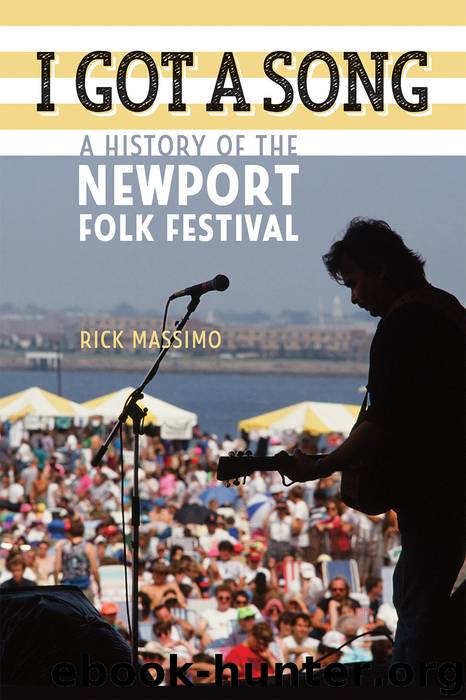I Got a Song by Rick Massimo

Author:Rick Massimo
Language: eng
Format: epub
Publisher: Wesleyan University Press
Published: 2017-06-01T16:00:00+00:00
10
This music is timeless. We’re here; they’re there. What’s different about it?
BILL MORRISSEY1
HE WAS AMAZED AND I WAS AMAZED
By 1985, the definition of folk music had broadened and its place in cultural life had changed. The singers and songwriters who took their cue from Bob Dylan, Joan Baez and the rest of what Joe Boyd had termed the Cambridge school were firmly and uncontroversially included under the umbrella of folk. And the music itself was no longer a world-changing mass communication among American youth—if they sought an alternative to the musical tedium and implicit conservatism of the mass airwaves, they found it in indie rock (then known as college rock), punk rock and hiphop. Instead, folk had become a durable niche entertainment, intended for the same generation that had always listened—who still carried the discontent with mainstream society that Pete Seeger and Ralph Rinzler had spoken about and that Murray Lerner had seen through his lens, whose concerns had changed as they had aged and who wanted music that kept up with them. The Newport Folk Festival returned to a different atmosphere, and it’s not surprising that the programming changed, George Wein’s native guide changed, and the festival’s reason for being changed.
Other changes were in store, some brought about by the necessities of the new landscape and some by the simple passage of time. The nonprofit ideal went by the wayside; the once-feared businessmen were welcomed as indispensable collaborators, and even as the artistic criteria that defined Newport became more fluid than ever, the perception of the fabled history of the festival slowly changed from albatross to selling point. This all made it possible for the festival to continue for two decades, but collisions were inevitable.
After the violence of 1971, it didn’t take long for the Newport Jazz Festival to find a new home. New York is one of the meccas of jazz, and George Wein had based his Festival Productions operations there for years, so it wasn’t a huge surprise that the Newport Jazz Festival–New York went off virtually on schedule in 1972.
The folk festival was another matter. Other folk festivals, such as the Philadelphia and Mariposa Folk Festivals, continued, but in terms of the centrality and importance that was part of the definition of Newport, Wein says, “We were dead…. Rock smothered the contemporary folk scene.”2
The debts had reached about $30,000 (about $168,000 in today’s dollars), and an attempt at producing a tour of what the organizers hoped would constitute miniature Newport Folk Festivals was unsuccessful—it took about two years just to pay off the fees owed to the tour’s advance-publicity man.3 In July 1972, a pair of benefit concerts at Carnegie Hall featuring Arlo Guthrie, James Taylor, Pete Seeger, Mimi Fariña, Richie Havens and others paid off some of the foundation’s debts.
Oscar Brand told the New York Times at the time, “We’re a proud people. We could have declared bankruptcy after the festival was canceled … but that would have meant paying back a penny on a dollar, and that isn’t the way we do things.
Download
This site does not store any files on its server. We only index and link to content provided by other sites. Please contact the content providers to delete copyright contents if any and email us, we'll remove relevant links or contents immediately.
The Rough Guide to India (Travel Guide eBook) by Rough Guides(449)
Hip-Hop Japan by Ian Condry(119)
